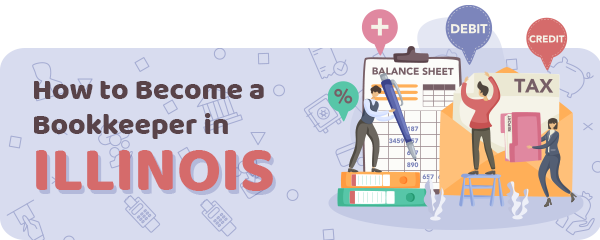Bookkeepers and accountants play vital roles in business operations, with distinct yet sometimes overlapping duties.
In Illinois, aspiring bookkeepers typically require backgrounds in business, accounting, or bookkeeping.
Strong mathematical skills and organizational abilities are essential for aspiring bookkeepers.
If you’re fascinated by numbers and order, delve deeper into this guide to uncover more insights into the field!
Article Table of Contents
How to Become a Bookkeeper – Step by Step
Obtaining certification is crucial in this field.
Certification can be achieved through two pathways – learning and practicing.
Both pathways consist of three steps and share some common elements.
Let’s explore these steps to gain a better understanding!
Step 1 – Earn Your High School Diploma
Securing a high school diploma or its equivalent is crucial for securing a job in this field.
It’s especially important if you plan to pursue further education in college afterward.
If obtaining a high school diploma is not feasible, obtaining a GED (General Educational Development) is a viable alternative.
Step 2 Education – Earn a Degree
While not mandatory, obtaining a degree can facilitate easier job placement.
As per the Bureau of Labor Statistics (BLS), a degree is necessary for the educational path.
Degree options include:
- Associate’s Degree
- Bachelor’s Degree
- Master’s Degree
Among these, the master’s degree is less commonly pursued by bookkeepers. However, it enhances credibility.
Later, we’ll explore schools where you can receive training.
Step 3 Education – Train on-the-job
Before becoming a bookkeeper, pre-employment training is necessary.
On-the-job training is common and typically lasts no longer than six months.
For those on the education path, becoming proficient with the employer’s bookkeeping software is essential.
Furthermore, improving efficiency to manage the firm’s transactions effectively is crucial.
Step 2 Practice – Gain Experience
The next phase for those choosing the practice path entails acquiring one to two years of practical experience.
AIPB requires two years of experience for certification eligibility.
In contrast, NACPB mandates just one year of experience for licensure qualification.
Step 3 Practice – Earn the Credentials
When pursuing credentials, it’s crucial to aim for at least one, but your prospects significantly improve with dual credentials.
Here are the credentials you can obtain:
- Certified Bookkeeping Professional (CPB) designation provided by NACPB
- Certified Bookkeeper (CB) certification obtained from the AIPB
Both NACPB and AIPB are nationally recognized associations offering these credentials.
Obtaining these credentials involves taking the four exams provided by these associations.
The first two exams are conducted at designated testing centers, while the next two exams are open-book, allowing reference to your manual during the test.
Even if you opt for an educational route to become a bookkeeper, you are still eligible for these licenses.
However, note that an additional 24 hours of training is required annually to maintain these certifications.
Bookkeeping Programs in Illinois
Which schools in Illinois have bookkeeping classes?
Let’s have a look!
Illinois Central College 
At this college, you can enroll in the Accounting Bookkeeping program in the Finance department.
The course is at the certificate level, but graduates have all the tools to enter the work field.
Those attending the classes full-time will complete the course in 24 months, or 5 semesters.
The approximate cost of the course is $5,120 and it covers supplies and various fees.
Each classroom has about 10 students.
SWIC Southwestern Illinois College 
The bookkeeping program is part of the Business and Management Certificates.
As a result, by enrolling in this program you’ll earn a certificate.
The program you enrolled in, has 29 credits to earn by the end of the program.
Some of the classes you’ll attend are listed below:
- Introduction to QuickBooks
- Financial Accounting
- Managerial Accounting
- Cost Accounting
- Intermediate Accounting
- Certified Bookkeeper Review
- Accounting for Small Businesses
- Individual and Business Income Tax
- Electronic Spreadsheets
University of Illinois Springfield 
If you want to attend a course offered 100% online, then the one offered by this university is for you!
The tuition is $2,195 and it covers the exam cost as well as the instructional materials.
The exam is the one offered by AIPB, and this institution will provide the 6 books needed for the exam.
Here are the books:
- Mastering Depreciation
- Mastering Inventory
- Mastering Internal Controls and Fraud Prevention
- Mastering Adjusting Entries
- Mastering Correction of Accounting Errors
- Mastering Payroll
| School Name | Address |
|---|---|
| Illinois Central College | 1 College Drive East Peoria, IL 61635 |
| SWIC Southwestern Illinois College | 2500 Carlyle Ave, Belleville, IL 62221 |
| University of Illinois Springfield | One University Plaza, Springfield, IL 62703, |
Bookkeeper Salary in Illinois
Now that you have all the education information, let’s also explore the average salaries of bookkeepers in Illinois.
According to salary.com, the median annual salary for bookkeepers in Illinois is approximately $45,223.
Earnings can vary based on factors like education level, experience, and location.
To identify cities with higher salaries, please refer to the table below.
Annual Salary Range:| Location | Avg. Annual Salary |
|---|---|
| Chicago | $46,372 |
| Evanston | $46,372 |
| Cicero | $46,372 |
| Riverside | $46,372 |
| La Grange | $46,328 |
| Berkeley | $46,284 |
| Elmhurst | $46,284 |
| Westmont | $46,239 |
| Mount Prospect | $46,195 |
| Newark | $46,107 |
Regional Salary in Illinois
| Region | Employed | Avg. Annual Salary | Avg. Hourly Pay | Top 10% Annual Salary | Bottom 10% Annual Salary |
|---|---|---|---|---|---|
| Bloomington, IL | 650 | $46,910 | $22.55 | $63,290 | $31,920 |
| Carbondale-Marion, IL | 410 | $43,110 | $20.73 | $59,780 | $29,080 |
| Champaign-Urbana, IL | 770 | $47,780 | $22.97 | $64,420 | $32,690 |
| Chicago-Naperville-Elgin, IL-IN-WI | 35,720 | $52,890 | $25.43 | $70,530 | $36,120 |
| Danville, IL | 200 | $45,140 | $21.7 | $62,270 | $31,080 |
| Decatur, IL | 400 | $48,790 | $23.46 | $63,970 | $33,970 |
| Kankakee, IL | 360 | $46,420 | $22.32 | $61,690 | $31,810 |
| Peoria, IL | 1,480 | $47,390 | $22.78 | $62,960 | $32,240 |
| Rockford, IL | 1,040 | $48,930 | $23.53 | $64,530 | $33,550 |
| Springfield, IL | 1,040 | $49,940 | $24.01 | $67,860 | $33,640 |
* Employment conditions in your area may vary.
Frequently Asked Questions
Which are the most common job duties of a bookkeeper in Illinois?
It’s important to understand what your duties will be once you get hired:
- Recording sales and purchases.
- Improving the company’s financial position.
- Documenting various transactions within the company.
- Using reporting tools effectively.
- Establishing, implementing, and overseeing systems to track the flow of money.
Does education and employment must be in a classroom or office, for bookkeepers in Illinois?
As demonstrated in the presentation, classes can be conducted in person, but online instruction is prevalent.
In terms of employment, this offers bookkeepers an ideal opportunity to work remotely, whether from home or elsewhere in the city.
Both office-based and remote work options have their pros and cons, as seen below.
Office:
- Various types of distractions
- Potential for better concentration in a structured environment
- Additional tasks may arise
- Limited flexibility in the sitting position
Remote (Home):
- Potential for fewer distractions
- Ability to concentrate in a comfortable environment
- Greater flexibility in tasks and schedule
- Freedom to adjust sitting position as desired
Are bookkeepers in high demand in Illinois?
Absolutely!
The demand for accountants, bookkeepers, and other specialists in this field is high.
With your skills and qualifications, finding employment should indeed be a breeze!
Read the full guide: How to Become a Bookkeeper



